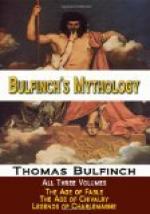“Yet in vain a paynim foe
Armed with fate the mighty
blow:
For when he fell, the Elfin
queen,
All in secret and unseen,
O’er the fainting hero
threw
Her mantle of ambrosial blue,
And bade her spirits bear
him far,
In Merlin’s agate-axled
car,
To her green isle’s
enamelled steep,
Far in the navel of the deep.
O’er his wounds she
sprinkled dew
From flowers that in Arabia
grew.
There he reigns a mighty king,
Thence to Britain shall return,
If right prophetic rolls I
learn,
Borne on victory’s spreading
plume,
His ancient sceptre to resume,
His knightly table to restore,
And brave the tournaments
of yore.”
After this narration another bard came forward who recited a different story:
“When Arthur bowed his haughty
crest,
No princess veiled in azure
vest
Snatched him, by Merlin’s
powerful spell,
In groves of golden bliss
to dwell;
But when he fell, with winged
speed,
His champions, on a milk-white
steed,
From the battle’s hurricane,
Bore him to Joseph’s
towered fane,
In the fair vale of Avalon;
There, with chanted orison
And the long blaze of tapers
clear,
The stoled fathers met the
bier;
Through the dim aisles, in
order dread
Of martial woe, the chief
they led,
And deep entombed in holy
ground,
Before the altar’s solemn
bound.”
[Footnote: Glastonbury Abbey, said to be founded by Joseph of Arimathea, in a spot anciently called the island or valley of Avalonia.
Tennyson, in his “Palace of Art,” alludes to the legend of Arthur’s rescue by the Faery queen, thus:
“Or mythic Uther’s deeply
wounded son,
In some fair space
of sloping greens,
Lay dozing in the vale of
Avalon,
And watched by
weeping queens.”]
It must not be concealed that the very existence of Arthur has been denied by some. Milton says of him: “As to Arthur, more renowned in songs and romances than in true stories, who he was, and whether ever any such reigned in Britain, hath been doubted heretofore, and may again, with good reason.” Modern critics, however, admit that there was a prince of this name, and find proof of it in the frequent mention of him in the writings of the Welsh bards. But the Arthur of romance, according to Mr. Owen, a Welsh scholar and antiquarian, is a mythological person. “Arthur,” he says, “is the Great Bear, as the name literally implies (Arctos, Arcturus), and perhaps this constellation, being so near the pole, and visibly describing a circle in a small space, is the origin of the famous Round Table.”
KING ARTHUR
Constans, king of Britain, had three sons, Moines, Ambrosius, otherwise called Uther, and Pendragon. Moines, soon after his accession to the crown, was vanquished by the Saxons, in consequence of the treachery of his seneschal, Vortigern, and growing unpopular, through misfortune, he was killed by his subjects, and the traitor Vortigern chosen in his place.




